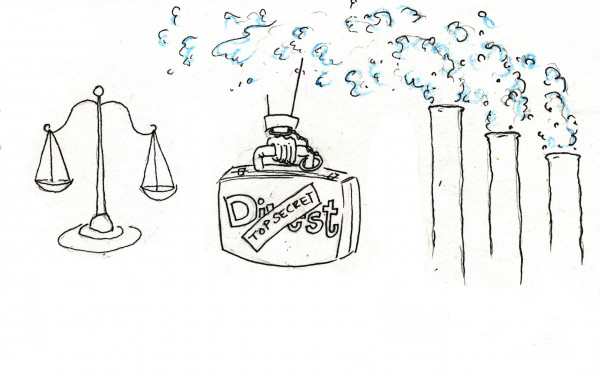Across Borders, Student Groups Unite Against Fossil Fuels
Student Divestment Groups Sweep Across North America
When experts from around the country arrived at McGill University on Feb. 7 for a conference on oil, energy and Canada’s future, they found the doors were locked.
Masked anti-capitalist protesters had fastened shut the front doors and barred the fire exits. The McGill Institute for the Study of Canada, which organized the conference, moved the event to another location until the so-called “lockout” ended quietly a couple of hours later.
On university campuses around the world, most students have found a different way to take a stand against fossil fuels and climate change. Instead of staging protests like the lockout, they have taken aim at universities’ investment portfolios.
“In general, we [at Divest McGill] tend to think of strategies that will serve to build support on campus, as well as increase the visibility of this support to key decision makers at the university,” said Divest McGill member Kristen Perry.
McGill’s divest group is not alone. There are campaigns across the globe, including one at Concordia, to encourage universities to divest their holdings from fossil fuel companies and reinvest in greener alternatives. Divest campaigns have sprung up on 18 Canadian campuses, over 300 in the U.S., and a handful of others in the rest of the world.
Advocates of divestment say it’s wrong for universities to profit from shares in the worst carbon-emitting corporations. Student-led divest groups are hoping their campaigns will hurt the fossil fuel industry as past divestment movements undermined apartheid in the ‘80s and big tobacco in the ‘90s.
So far, the U.S. divestment movement has had mixed success. Nine American colleges have agreed to divest. However, Harvard University, which has the biggest endowment fund in the country totaling around US$32.7 billion, has refused.
No Canadian university has pledged to go fossil-free.
Concordia and McGill
That comes as little surprise to Anthony Garoufalis-Auger of Divest Concordia.
“There’s not as much openness to divestment here as there is in the U.S.,” he said. “[Canadian universities] are more rigid in the way they operate.”
He added that it would be “hard to imagine” Concordia following the example of colleges in the U.S. that agreed to divest, such as Unity College in Maine. The first fossil-free American university, Unity reported last May that it lost no money from its decision to divest its $14.5-million fund.
“Divestment is one of the only campaigns in the modern climate movement focused on true systemic change.”
—Chloe Maxmin, Divest Harvard
“We don’t have the same kind of activism in our [Canadian university] administrations,” Garoufalis-Auger said.
Divest Concordia has still managed to persuade the university to rethink its investment practices. In January, student reps sat down with board members of the Concordia University Foundation—the university’s $136.6 million endowment fund—and the university treasurer to plan an ethically responsible investment policy.
The policy is still in the very early stages, but Divest Concordia is hoping the university will soon start screening companies based on their environmental track record.
“We are dealing with complex issues that require a lot of discussion and exchange,” said university spokesperson Chris Mota.
The push for divestment has received the support of the Concordia Student Union, which officially endorsed Divest Concordia in September.
At McGill, student efforts for divestment have run up against a wall. In February 2013, they submitted two petitions with 750 signatures each to the Board of Governors to divest from fossil fuels, oil sands and the Plan Nord, but they were rejected.
In years past, McGill has divested from tobacco and Burmese businesses. But the McGill Board said the university relies on its fossil fuel investments and that it doesn’t meet the board’s standards for divestment based on “social injury.”
“Whether you like it or not, Canada is a resource-based economy,” board member Michael Boychuck told The McGill Daily. “That’s a fact. It’s not going to change any time soon.”
Divest McGill isn’t taking no for an answer.
“Through proving the failure of the ‘official’ process we can justify beginning to escalate our campaigns and start putting strategic pressures on other change-making avenues in the university,” said Divest McGill member Kristen Perry.
Although not involved in the lockout of the Faculty Club during the oil conference on Feb. 7, Divest McGill—and its counterpart at Concordia—supported the protesters.
The Divest McGill campaign has been endorsed by three major student societies representing 30,000 students.
“It’s definitely progressing,” said Amina Moustaqim-Barette, a member of Divest McGill. “As we get more info about alternative investments and more support on campus, the idea is becoming more popular with the administration as well.”
Divesting Harvard
If American colleges have generally been more open to divestment, Harvard is an exception.
Members of Divest Harvard estimate that the university has invested US$32.6 million in the top 200 fossil fuel companies.
In November 2012, 72 per cent of undergrads voted in favour of divestiture. Harvard President Drew Faust responded with an open letter: “I do not believe, nor do my colleagues on the Corporation, that university divestment from the fossil fuel industry is warranted or wise.”
“The endowment is a resource,” she continued, “not an instrument to impel social or political change.”
Divest Harvard disagrees. Coordinator of the group, Chloe Maxmin, says “divestment is one of the only campaigns in the modern climate movement focused on true systemic change.”
“Divestment is important because it is bypassing a government that is inefficient and clogged by the power of the fossil fuel lobby,” she wrote in an email to The Link.
“It’s going straight to the source of carbon extraction and political gridlock: the fossil fuel industry.”
Update: The Link originally reported that the McGill oil conference, “Petroculture 2014,” took place on Feb. 8. In fact, the conference was held Feb. 6 and 7. The Link regrets the error.

(The_McGill_Daily_900_600_90.jpg)



_600_375_90_s_c1.jpg)

